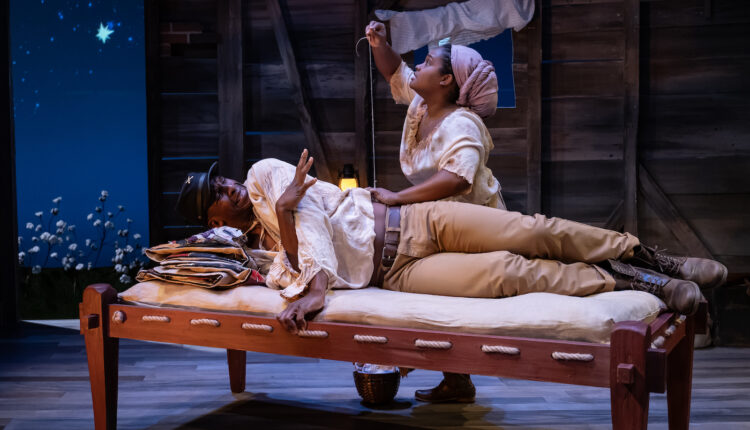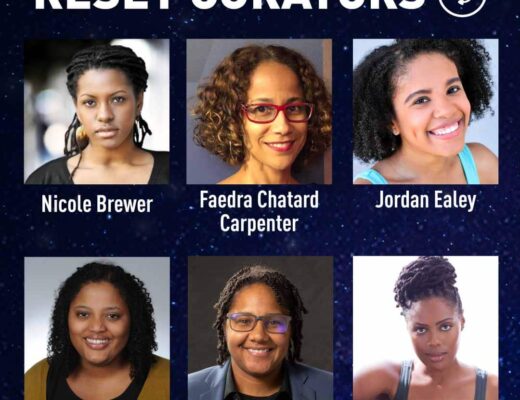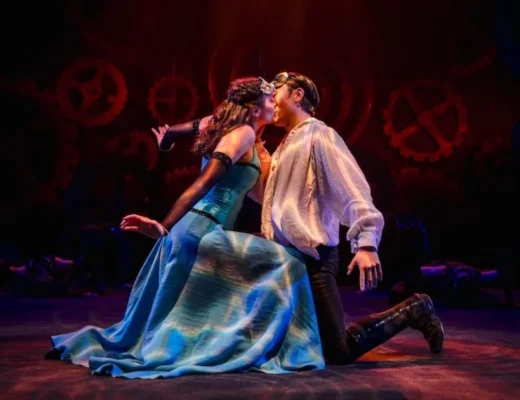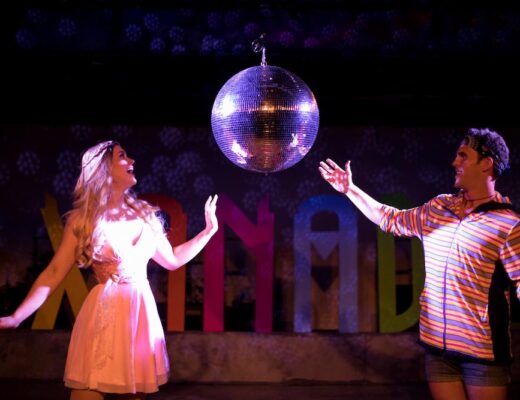By D.R. Lewis
This article was originally published in The DC Line, here.
From the moment one walks into the Atlas Performing Arts Center for Dominique Morisseau’s Confederates, it is clear that the audience is about to be transported. In this new production by Mosaic Theater Company, sparse patches of artificial grass lead from the theater’s entrance, to the bleacher-style seating that surrounds the stage, and into scenic designer Nadir Bey’s massive set. A wooden platform consisting of a modern-day college professor’s office and the rustic accouterments of a 19th-century plantation cabin dominates the stage, surrounded by a field of puffy cotton shrubs. The set evokes not only a strong sense of two places but also a contrast between a distinct past and present — a clear signal that the narrative will traverse time during the play’s 90 minutes.
The sharp imagery doesn’t end with the abundant bulbs of pillowy cotton. College professor Sandra (Nikkole Salter) soon steps onstage to welcome the audience and detail her credentials as a Black academic. She says she has long been unafraid to confront depictions of slavery and summons an early photograph of an enslaved woman nursing a white child. The striking image is amplified when Sandra reveals that an unidentified individual has taped a printed copy of it to her office door, with Sandra’s face photoshopped over that of the woman. As she sets out to determine who did this, she simultaneously faces the scorn of her students as well as colleagues on various counts: Malik (Joel Ashur), a Black male student who insists she favors women; Candice (Caro Dubberly), a white student who works for Sandra and struggles to hide her passive racism behind her well-meaning progressivism; and Jade (Tamieka Chavis), an untenured professor who feels Sandra hasn’t done enough to help her Black colleagues obtain the same level of professional success.
Juxtaposed with Sandra’s scenes are those set on a Southern plantation during the Civil War. They center on Sara (Deidre Staples), an enslaved woman far more clever than many who live on the same plantation, including her enslaver’s daughter, Missy Sue (Dubberly); Sara’s brother Abner (Ashur); and potential comrade Luanne (Chavis). Unable to conceive a child, Sara makes a home for herself in a cabin on the plantation, watching after her brother and others. When Missy Sue returns from the North, where her philandering husband has abandoned her, she adopts newfound abolitionist values and a lust for her old “friend.” Sara decides to capitalize on the moment and seize her freedom by whatever means necessary.
In chronicling the experiences of these two women, Morisseau digs into the compounding pressures and contradictory expectations that some segments of society place upon Black women, who must also navigate ever-shifting racial and gender dynamics. For instance, Sandra is accused of coddling her white students yet also giving more of her time to Malik than others. And when Sandra faces quiet social backlash for wearing a Black Lives Matter T-shirt to class, Jade accuses her of not being supportive enough of Black students and colleagues. Despite being exceptionally talented, educated, intelligent and successful, Sandra is met at all turns by others’ broken expectations of her — though none recognize her humanity enough to ask about her personal struggles, which include a failed marriage and difficulty conceiving a child.
Likewise, Sara spends most of her life performing manual labor despite her intellect and wit. As a child she was beaten for learning more quickly than Missy Sue how to read, and for asking to sleep in the plantation house. And although she is braver and more resourceful than her brother Abner, she is left behind when he joins the military.
Both Sara and Sandra are objectified for their race by the white women who purport to admire them, challenged professionally by women who have a similar social standing, and disrespected by the men who rely on them. In parallel scenes, Morisseau seems to assert that the social working dynamics on college campuses, or the professional expectations put on Black women today, aren’t so different from those of the plantations. Bey’s set underscores this notion, building Sara’s cabin and Sandra’s office on top of a single cotton field. Morisseau adds wide strokes of satire amid dialogue that shifts from cutting to sincere — not to lighten the moment, but instead to illustrate the absurdities these women face. That Morisseau is able to effectively critique racial and gender politics in such a short amount of time is testament to her skill as a playwright.
Even so, the production suffers from some dramatic imbalances. Morisseau successfully injects a certain amount of shock value into the play through her writing, particularly in Sara’s scenes, such as when she sews shut her brother’s accidental self-inflicted knife wound on his backside or capitalizes on Missy Sue’s advances to flip the dynamic and assert her own power. Nonetheless, over-the-top performance choices at times tilt the production a bit too far, causing emotional whiplash and confusion when reverting back to the realism of Sandra’s scenes. Though many of those choices inspire audience laughter, they ultimately pull focus from Sara and Sandra.
Director Stori Ayers makes deft use of Bey’s set, at first firmly rooting her leading women in their respective sides of the platform before allowing each of them to step into the other’s space. Ultimately, the interwovenness of their experiences, notwithstanding the distance between their respective eras and circumstances, is fully realized when Ayers satisfyingly brings Sara and Sandra together into one space — and as close as they can come to the audience — during the most moving moments of Morisseau’s play. Ayers’ production is also supported by Deja Collins’ stirring projections; John D. Alexander’s lighting design, which uses blues and purples to create an appropriately moody scene; and Moyenda Kulemeka’s distinctive period costumes. Meanwhile, sound designer David Lamont Wilson’s smooth insertion of musical clips, ranging from the Confederate anthem “Dixie” to Beyoncé’s “Freedom,” adds emotional weight to the play’s transitions.
Whereas Salter’s slow-burning Sandra builds to her breaking point, Staples’ Sara is spirited from the outset. Staples, in particular, has a remarkable command of the stage. Her mature, moving portrayal of Sara echoes her excellent work as the younger, socially conscious Carmen in James Ijames’ Good Bones at Studio Theatre earlier this year. And Chavis, despite being a last-minute addition to the cast and using a script for the performance this reviewer saw, is excellent in both of her roles, especially Luanne.
Confederates is strong evidence of why Morisseau is regarded as one of the leading dramatists of our time. One could rattle off the well-deserved honors that have been bestowed upon her — they include a 2018 MacArthur Fellowship — but the proof is in the writing. In addition to exercising a keen sense of storytelling economy, Morisseau is able to effectively balance hefty arguments with precise character specificity. Bolstered by a creative team that steps up to meet the challenge, Mosaic’s production of Confederates is a worthwhile journey for Washington theatergoers.





No Comments